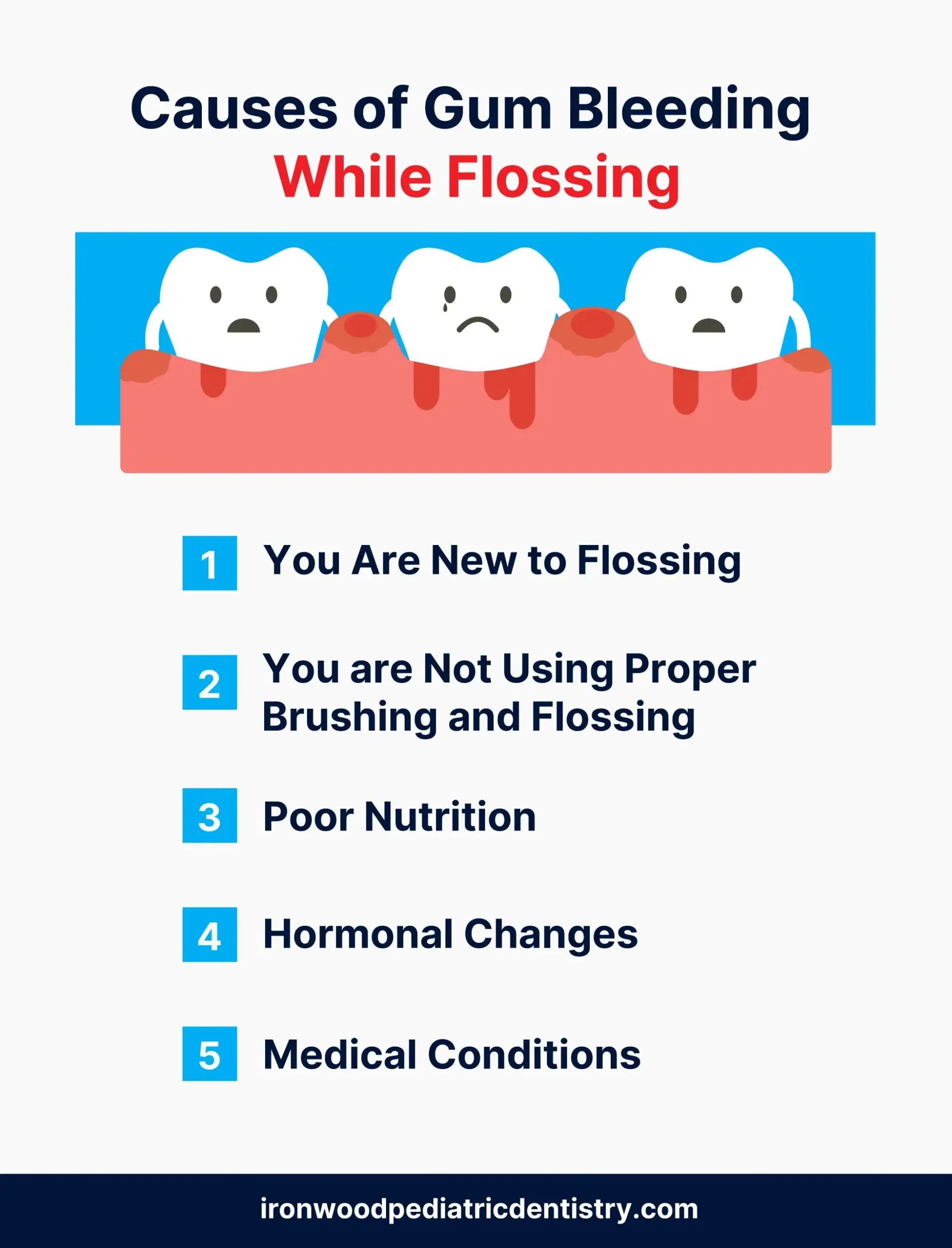Sometimes oral health problems can be hard to detect. For example, a cavity can hide on a surface between two teeth so you can’t see it, and early signs of misaligned teeth are often something only a dentist or orthodontist can recognize.
Other times, however, evidence of possible dental health trouble is easy to spot. Bleeding while brushing your teeth or while flossing is one obvious sign of trouble brewing in your mouth.
Here we discuss dental bleeding in general and particular during flossing, to answer some of the most common questions we get from our child patients and their parents:
- “Why do my gums bleed when I floss?”
- “What are the possible consequences of gum bleeding?”
- “What can I do to reduce or stop gum bleeding while flossing?”
If you notice blood coming from your mouth while you are brushing or flossing, and this condition has persisted for more than three days, it could be a symptom of a serious oral hearth problem. We recommend you call us at Ironwood Pediatric Dentistry today, (480) 422-4544, to schedule a checkup appointment so we can find the cause of the bleeding and treat it.
Causes of Bleeding Gums in General
Bleeding from your gums is a symptom of tissue damage. Healthy gums generally bleed little if at all when subject to flossing, so if you see blood then the question becomes what is causing your gums to weaken to the point where your flossing technique (or flossing at all) hurts them?
Here are some of the most common reasons our pediatric dentists see for bleeding gums.
Gum Disease
Gum disease is a common cause of gum bleeding. Gum disease takes two forms. Early gum disease is called gingivitis, and advanced gum disease is known as periodontal disease.
Gingivitis is caused by the buildup of plaque along the gum line of your teeth. Plaque buildup happens when you do not brush or floss your teeth often enough, leaving food particles and sugar on the surface of your teeth for bacteria to eat. The acid these bacteria produce as a byproduct of digesting this leftover food is what eats at your tooth enamel and builds up into the slimy film that is plaque.
Plaque contributes to gum inflammation and bleeding by causing swelling that leads the gums to begin pulling away from your teeth. When you brush and floss on gums suffering from gingivitis, this can irritate the gums further and bleeding can result.
Periodontal disease is what happens when plaque hardens into tartar and the tartar forms pockets under the gum line. The symptoms of periodontal disease are in some ways the same as for gingivitis, only worse: more inflammation, more irritation, and more blood when you brush and floss.
But the longer you leave periodontal disease untreated, the more you will see other, more serious symptoms appear: loose teeth, tooth decay, tooth loss, and possibly even long-term effects like diabetes, heart disease, lung disease, stroke and arthritis.
Causes of Gum Bleeding While Flossing
If you notice that your gums are bleeding when you floss, then aside from the common culprits of gingivitis or periodontal disease there could be other reasons why this is happening. We’ll take a look at these other possible causes next.
You Are New to Flossing
It is never too late to start flossing. When you begin your flossing routine, it is not uncommon to see some bleeding at first as your gums are not yet used to the stimulation. Ordinarily, this initial bleeding should subside within a week.
You are Not Using Proper Brushing and Flossing Techniques
Although your gums will toughen up once you get used to flossing regularly, gum tissue remains sensitive to the application of excessive force when brushing or flossing. This can especially be the case when using hard bristle toothbrushes, or an old toothbrush that leads you to apply more pressure while brushing, or when you are flossing too deeply below the gum line.
Poor Nutrition
Your gums need the right kinds of nutrients in enough quantity to stay healthy. Poor nutrition, especially diets lacking in Vitamins C and K, can contribute to gum bleeding.
Hormonal Changes
One possible effect of natural or artificial changes to your body’s production of hormones, is an increased blood flow to soft tissues. This, in turn, can cause your gums to become inflamed and more sensitive to brushing and flossing. Some of these hormonal changes are:
- Going through puberty
- Going through menopause
- Using hormone-based birth control
- Being pregnant
Medical Conditions
Some medical conditions can affect your gums’ resistance to bleeding. These include cigarette smoking, substance abuse, diabetes, autoimmune diseases, leukemia, hemophilia, and stress.
Using medications that have the effect of thinning the blood can also be a contributing factor to gum bleeding while flossing.

How to Reduce Gum Bleeding While Flossing
Although you may have little influence over some causes of gum bleeding during brushing and flossing, like having a medical condition, many times controlling gum bleeding is something that you can minimize or stop by developing good oral health and hygiene habits. Here are some tips you can use to reduce gum bleeding on your own:
Do Not Get Discouraged Early
It can take your gums a little time to get used to a flossing routine, especially if you have not regularly flossed before. During this break-in period, some bleeding from the gums is normal. Because of this, sometimes it can be tempting during the first few days of a new flossing regimen to think that you are doing more harm than good; do not give in to this thinking.
Most importantly, do not quit. If you stick with flossing as a regular habit, your gums should stop this initial bleeding within a few days.
If the bleeding continues after a week or so, then this could be a sign that you have a more serious contributor to gum bleeding like gum disease. But even in this case it is better to keep up with your flossing and to see us for a cleaning appointment than to stop flossing.
Like with any preventive health measure, flossing is as effective as your regularity in doing it. Flossing is invaluable in helping to slow the buildup of plaque and tartar, the two biggest contributors to gum disease which is itself the leading cause of bleeding gums.
Learn to Brush and Floss Thoroughly and Correctly
Brushing your teeth the right way is not hard to do. But it is important to understand how brushing at least twice daily and flossing at least once daily work together to support your teeth and gum health.
If you want to maximize the benefit of tooth brushing, you might consider buying a battery-powered electric toothbrush. Evidence suggests that electric brushes are more effective than manual brushing, and many modern electric toothbrushes have timers to help you spend enough time brushing during each session.
The importance of flossing comes from the fact that even if you brush your teeth thoroughly, you are still brushing only about half of the surface of your teeth. The rest – the tooth surfaces between teeth and just below the gum line – is where proper flossing comes in.
See Your Pediatric Dentist Regularly
Taken together, the combination of good oral hygiene habits like regular brushing and flossing coupled with seeing your pediatric dentist two times a year for regular checkups is a highly effective combination to minimize or even prevent tooth decay, gum disease, gum bleeding, and other oral health problems.
If you need to learn how to better brush and floss your teeth, we can help show you how. And scheduling regular teeth cleanings with one of our dentists at Ironwood Pediatric Dentistry can make sure that even if plaque and tartar are forming under your gum line, they won’t stay there long enough to cause harm.
Call Ironwood Pediatric Dentistry Today
Are you presently experiencing gum bleeding? You do not have to accept it. Call us now at (480) 422-4544 to schedule an appointment so we can treat the underlying problems that are causing you to see blood when you brush or floss.
If you are wondering, “Where can I find treatment for bleeding gums near me?”, then call Ironwood Pediatric Dentistry at the number above. Or, if you prefer, you can get in touch with us online and we will get back to you as soon as possible.
There is no reason to accept bleeding gums. Moreover, bleeding gums can be a sign of worse trouble. Call our dental team at Ironwood Dental now at (480) 422-4544 and let one of our Scottsdale pediatric dentists help make gum bleeding nothing more than a memory.

